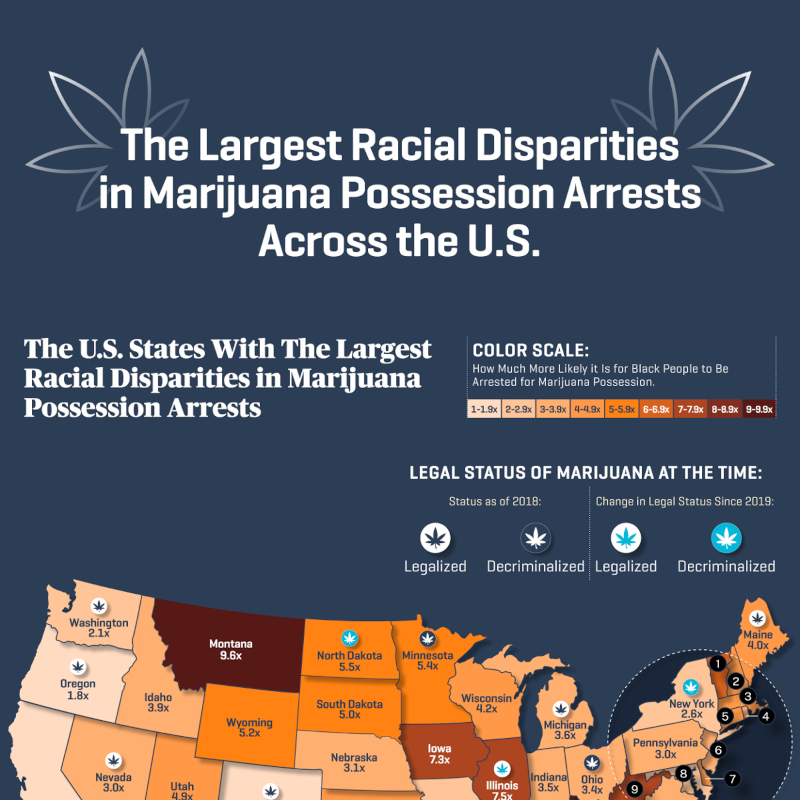Is America’s Approach to Cannabis Racist? Study Shows It’s Worse Than You Think

A recently published study showed that Black people are 3.6x more likely to be arrested for marijuana possession than white people in the United States, and the gap is growing. The research, conducted by the American Civil Liberties Union (ACLU) and compiled by Joslyn Law Firm between 2010 and 2018, suggests “War on Drugs” racism still permeates cannabis law enforcement, even though 1 in 3 Americans now live in a state where marijuana is legal.
RELATED: Will Cannabis Become Legal in 2021?
The difference between white and Black marijuana arrests rose by over 300% in 20 U.S. counties between 2010 and 2018, according to the study. In Carter, Tennessee, racial disparity in this department increased by 977%, making Black people 14x more likely to be arrested for marijuana than whites in 2018.
Of the 49 states reporting (Florida did not contribute to this study), the state with the highest racial disparity was Montana, where Black people were almost 10x more likely to be arrested for marijuana than white people. Kentucky, Illinois, Iowa, and West Virginia followed close behind, with the chance of arrest for Black people above 7x what it was for white people.
Two of these states have since legalized recreational marijuana, indicating that the issue has little to do with overall attitudes toward marijuana use in these states. Cannabis became legal in Montana this November, and Illinois legalized it January, 2020.
Recreational marijuana is illegal in Kentucky, Iowa, and West Virginia. Though West Virginia has a medical marijuana program now, it had not gone into effect during the time this data was collected.
RELATED: Where is cannabis legal in the United States? (Medical marijuana and CBD included)
The states with the lowest racial disparities in cannabis arrests were Colorado, California, and Oregon. Recreational cannabis has been made legal in each of these states within the years this data was collected.
Brian Joslyn, Owner of Joslyn Law Firm, said areas of the country with the highest racial disparity in marijuana arrests also tend to record vague and bizarre reasons for other charges against Black people.
“All too often I see suspicious police reports that justify traffic stops and detentions of black people with suspicious justifications ultimately leading to a search and seizure of their persons. It’s these kinds of suspicious justifications that I rarely see as much when the individual is white,” Joslyn told GreenState. “I believe the data clearly shows that black people are being targeted by police. It would be impossible to suggest otherwise.”
Every year, roughly 700,000 marijuana-related arrests are made in the U.S, meaning this problem is effecting thousands of people every day.
Joslyn said he believes legalizing marijuana would only be the first step in erasing racial prejudice from cannabis charges, since law enforcement would continue to unlawfully detain and search a disproportionate number of Black people for drug impairment or other violations of cannabis law. Therefore, he believes a kind of “deep clean” of law enforcement around the country to be imperative for racial justice.
RELATED: The Difference Between Cannabis Legalization and Decriminalization, and Why it Matters
“What needs to occur are policy changes within the police departments that train and instruct officers to only pull over or detain individuals for well-established violations of law,” Joslyn said. “In addition, all officers should be equipped with both cruiser cams and body cams so their arrests can be reviewed and verified, and our state legislatures need to further work to protect individuals’ Fourth Amendment rights through the passage of laws that would raise the standards for law enforcement to search one’s persons or property.”

By CriminalAttorneyCincinnati.com
Elissa Esher is Assistant Editor at GreenState. Her work has also appeared in The Boston Guardian, Brooklyn Paper, Religion Unplugged, and Iridescent Women. Send inquiries and tips to elli.esher@hearst.com.